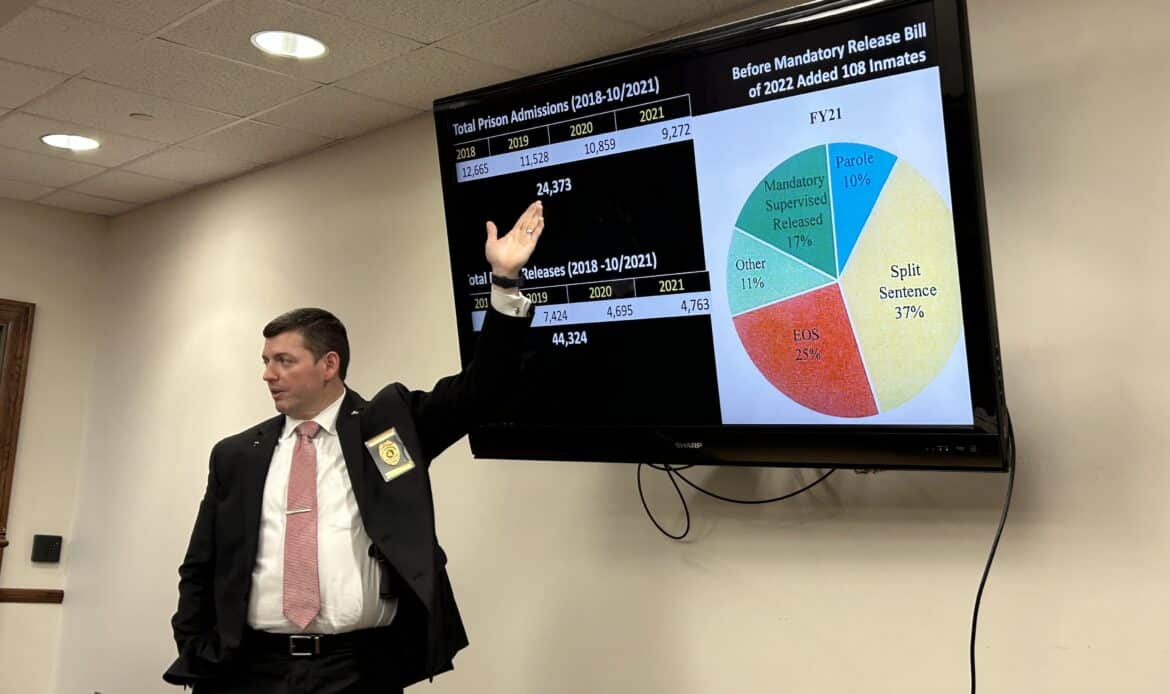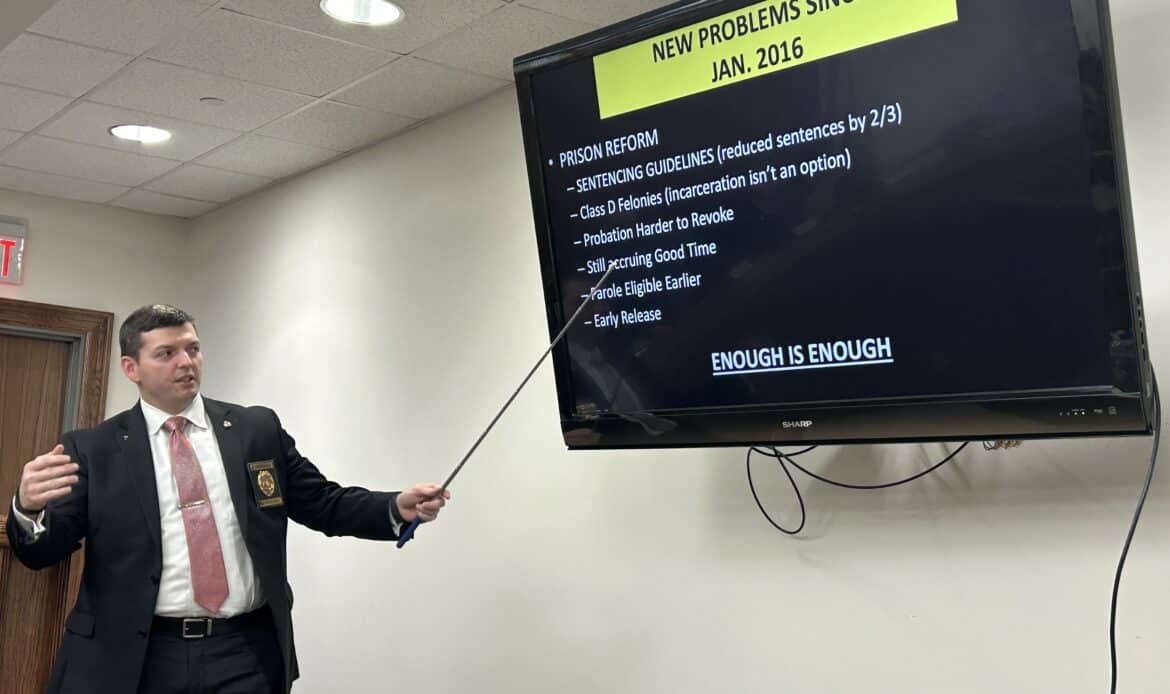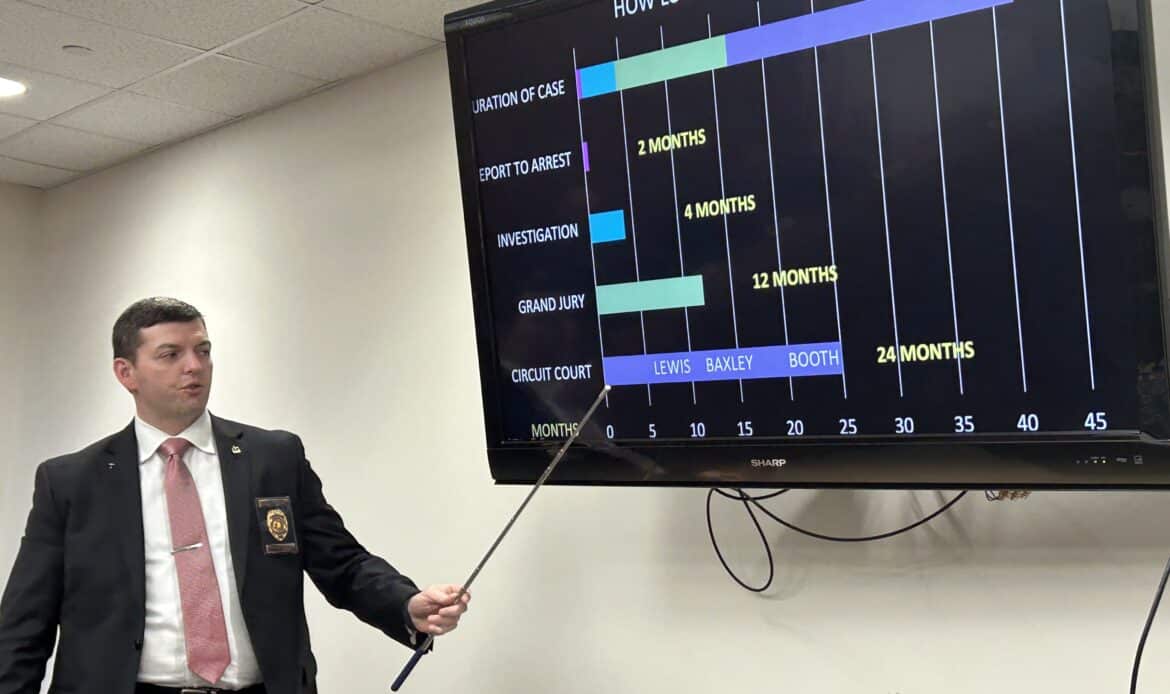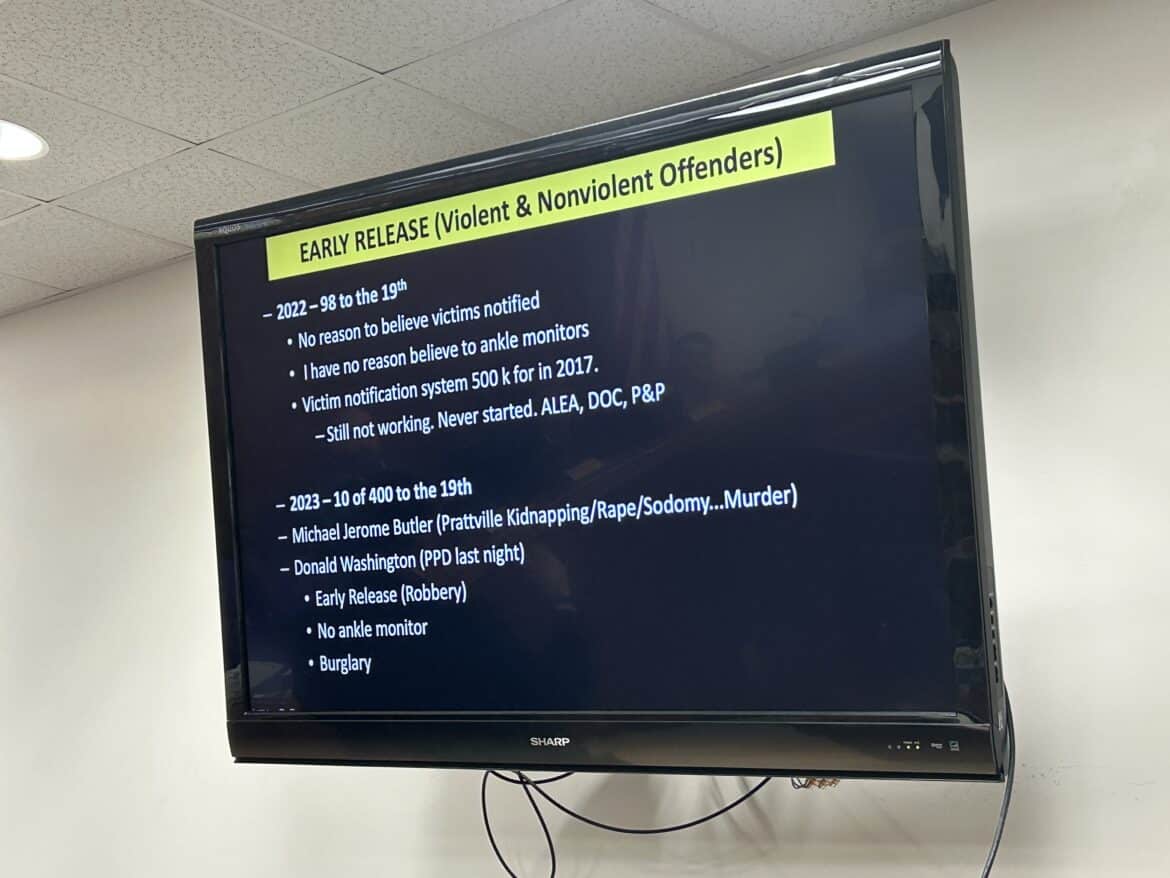
By Carmen Rodgers
Elmore/Autauga News
District Attorney CJ Robinson addressed the Autauga County Commission Tuesday, Feb 7, at the regular meeting. Robinson explained how the Prison Reform Act has affected the Circuit Judicial System.
In his opinion, it is devastating. However, he says there is an opportunity to rectify the damage.
“We can fix it,” Robinson said. “The District Attorneys Association has a Unified Crime Bill package for the first time ever and we are working in conjunction with the Attorney General. If we miss this opportunity, I don’t know what level of mass public devastation with innocent people getting victimized will be required to fix it.”
According to Robinson, Autauga County sees 8,300 cases a year, many of which are repeat offenders. In 2014 Alabama prisoners were at 197% capacity. In 2015, lawmakers passed the Prison Reform Act.
Since then, the prison population has decreased, but the question Robinson said is at what cost?
“The answer is, in 2015, the state of Alabama put a price tag on public safety. I put a price tag on it, and we’re paying for it today,” Robinson, said.
It has been eight years since the Prison Reform Act went into effect and, according to Robinson, there is now an entire generation of young adults who have seen their elders be charged with crimes repeatedly, without serving a day in jail.
“More violent crimes are being committed by 20- and 21-year-olds than ever before. The murders, robberies, the kidnappings. What I am telling you is because since 2015, they started watching mom and daddy not go to jail for crimes that were committed. This group has come up over the last eight years, they’re now young adults and they have no concept of punishment, no concept of accountability. We have done that. We have brought that generation up, and you want to know why the 20- and 21-year-olds are shooting and killing, raping and kidnapping? It’s because we put a price tag on public safety. And now we’re having to cash that check.”
The Prison Reform Act also added a Class D Felony which carries a standard sentence of 366 days to five years. Examples include theft of property worth more than $500 but less than $1,500, fraudulent or unauthorized use of a credit or debit card, and possession of a controlled substance for personal use.
“When the legislature passed the Prison Reform Act, they said ‘we’re going to make it a year and day to five (years). But they put a clause at the end and it said, ‘you cannot go to jail.’”. You cannot go to prison on a Class D,” Robinson said.
Robinson explained that with the addition of the Class D felony, a repeat offender could be arrested for the same crime and convicted multiple times before ever seeing a day in jail.
“So, the first time you get pulled over, let’s say you provide information to the officer. They call in the narcotics investigator, you give some information, they cut you a break. Second time, you get convicted, you go to court, you do pretrial diversion, a program run by the DA’s Office for first time offenders, keep your nose clean, jump through the hoops for about nine months, your case gets dismissed. Third time you get arrested. You already have a conviction, but it is gone, so there’s not really a conviction. You can do drug court, a program run by the judges, Administrative Office of the Courts. It’s like pretrial diversion, two times really. You can actually do that twice. So, by your fifth arrest, now you have a conviction, but guess what? It is Class D so I can’t go to jail. Sixth arrest, conviction, Class D, I cannot go to jail. On the eighth arrest and a conviction that moves to a Class C felony, and jail is on the table.”
In the past the DA’s office, along with judges, had discretion when it came to court cases. Now, under the Prison Reform Act, there is a sentencing standard worksheet which scores crimes. The guidelines within that worksheet must be followed when sentencing someone.
“I want to tell you, I will raise my hand and I swear to you, you’re probably going to need an additional four convictions of those type crimes before a recommendation for you to get locked up for one day. So, I’m sitting here and telling you, as God is my witness, you may have up to 11 or 12 convictions before one day of jail was possible,” Robinson said. “The sentencing guidelines cut sentences by about two thirds. If you used to get the 15 years, now you’re going to get about 5.”
In addition to lessening sentences, in most cases the offender can receive “goodtime.” In the past, goodtime was earned. Not today.
“In Alabama you receive goodtime if you involuntarily breathe,” Robinson said. “I’m oversimplifying, but as long as you just breathe, you can get up to 75 days of credit for every 30 days that you sit there.”
With parole, a sentence can be cut by nearly two-thirds.
“We have people with 15-year sentences, getting parole hearings in 18 months,” Robinson said. “The Parole Board has made it clear that their policies that have been written so that if nobody objects, you can mark it down, they are getting out.”
Robinson presented a two-year crime stat average to the Autauga County Commission. The stats, according to Robinson, are lower than they should be.
“Let me tell you why they’re low,” Robinson said. “There are no drug cases. The State of Alabama is not testing drugs. I cannot go forward with my drug case unless I get a sheet of paper from the Department of Science that says, ‘this substance is cocaine, this is heroin.’ After COVID the State of Alabama had other labs that got behind, they shut down the Montgomery lab. Montgomery has been outsourced to help everywhere else in the state catch up. I have not received a tox report from the Montgomery lab in a year and a half.”
Those reports, once complete, will eventually make their way to the District Attorney’s office.
“’I’m going to wake up one day and have 500 tox reports in my mailbox,” Robinson said.
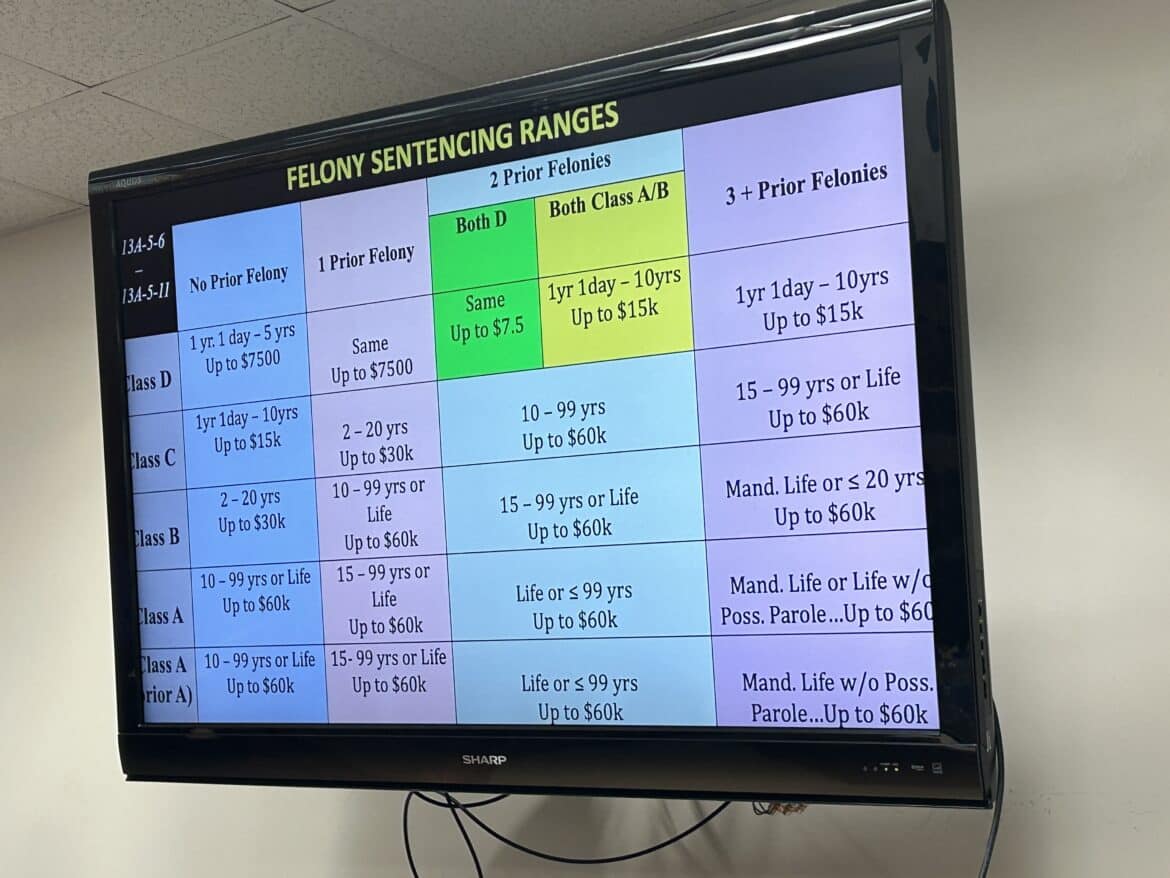
The Prison Reform Act aimed to help with the State’s overcrowded prison population.
“They were built at capacity in the 60s. Our population has boomed, we’ve not increased prison capacity. Actually, today, we have closed facilities because of maintenance and dilapidation,” Robinson said.
The prison population is decreasing. In 2022 the prison population rate was at 137%.
“You see this number dropping,” Robinson said. “In 2022 it was down to 137 percent. For every one person that goes to prison, two are coming out.”
Robinson explained the saying, “three strikes and you’re out,” in fact is not true.
“If you hear three strikes and you’re out, that is a lie. That has never been the law in Alabama. It will never be the law in Alabama. Is there a way for your third conviction to be three strikes and you’re out? Sure. If you got about three different murders and rapes and everything else, but that’s not what the law is, but that is what gets sold a lot of times to the public,” he explained.
According to Robinson, when a crime is committed, it could take years before the case goes to court.
“From the time you come home, and your door has been kicked in, until the time of the trial, it can easily be almost four years. It’s sad, it’s frustrating, it’s infuriating,” he said.
“Autauga County is the catalyst for what is going to change this,” Robinson said. “Autauga County is the catalyst for what is going to change this system. And I’ll tell you about it now. Michael Jerome Butler is the one who did it, and we’re going to fix it. He was sentenced on four different occasions. His probation was revoked on four different occasions and he went to prison. He still got wrapped up and got early release in ‘22 even though he was a violent offender, because of the bill that was passed. He gets out. On the bill that was passed you have an ankle monitor and the victim has to be notified. And I’m telling you they were not. So, he gets out. He doesn’t check in with any parole probation officer. He leaves Greenville, comes to Autauga County, goes to Walgreens and kidnaps two 17-year-old girls going to buy a birthday card for their teacher.”
The teens were subjected to torture but survived the incident.
“He didn’t kill them. He drops them off. He goes to Atlanta, he does a home invasion, kidnaps a woman. He shoots her in the chest. She doesn’t die, miraculously. Then he kidnaps another woman somewhere around Pell City. There was a highspeed chase the St. Clair County, he kills her. He got out, he wasn’t being monitored.”
Until these changes are made, Victim Service Officers are there to advocate for the victims. However, Robinson pointed out that funding for Victim Service Officers has recently been cut. A VSO plays a vital role in the judicial system.
“We have more victim crimes than ever,” Robinson said. “Those Victim Service Officers are our first responders.”
19th Judicial Circuit is comprised of Chilton, Autauga, and Elmore Counties. There are roughly 190,000 people in the 19th Judicial Circuit. Every year, on average, this Judicial Circuit System hears 27,000 cases. The 19th Judicial Circuit is the largest in the State, outside of the one-county-circuits.
“We’re the largest multi-county circuit in the state of Alabama,” Robinson said. “Every county larger than us on the stat sheet are your one-county circuits. Montgomery, Jefferson County, Madison County, Mobile County, Baldwin, Shelby, then you get into Tuscaloosa, and us, depending on how you slice it up.”
Most cities and towns in the 19th Circuit are perceived as small towns, with that hometown feel, but that is often a mirage, Robinson said.
“The reality is the big city crime that you see, we have those statistics too,” Robinson said. “They’re just spread over three counties, and it is actually staggered. When you have counties talking about their capital murder rates and stuff like that, we have that too, just multiply it by three.”
If you feel corrections need to be made to the Prison Reform Bill, contact your area legislators.
